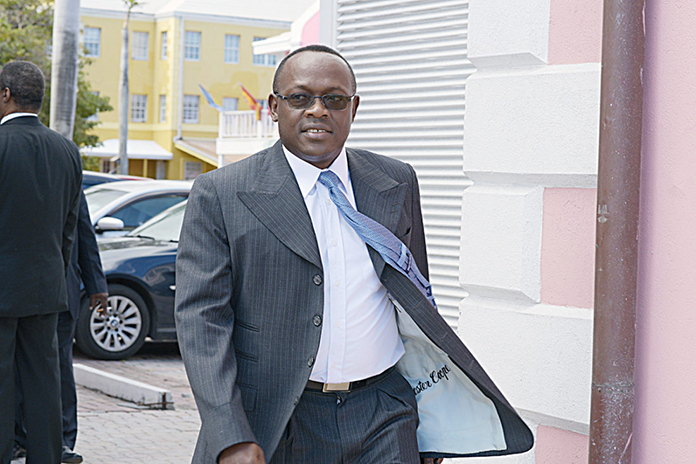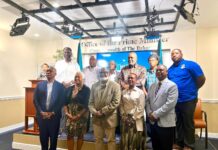CONTRIBUTION TO THE ECONOMIC EMPOWERMENT ZONE BILL 2018
CHESTER COOPER, EXUMAS AND RAGGED ISLAND MP, DEPUTY PLP LEADER
JULY 25, 2018

Mr. Speaker,
The people of Exumas & Ragged Island thanks you for this opportunity to contribute to the Economic Empowerment Zone Bill 2018, or as it is better known, the Over the Hill Initiative.
I’ll, in fact, just call it that from here on to make things simpler.
But before I get into the heart of my presentation, let me just offer, for the record my condolences to the family of the recently departed Basil Sands, and the family of a former member of this House, Phenton Neymour.
I would have already expressed condolences privately and on the TeamCooper Facebook page, but I wanted to just say something brief in this place.
I knew both men personally.
Mr. Sands was instrumental in helping me in my business. And Phenton was a native of Exuma, who I’d known and interacted with for quite some time.
They were both extraordinary men in their own right, Mr. Speaker; both leaving their mark on their nation.
We were lucky as Bahamians to have had them, even if they were on borrowed time from our Heavenly Father.
I will miss them both. May they rest in peace.
Focusing on the business before us, Mr. Speaker, perhaps you will forgive my candor, or perhaps you will not before we take our summer break, but this past year in this place has been a real spectacle.
A spectacle of governance replete with entertainers and a ringmaster who doesn’t seem to know what’s going on in any of the rings at any time.
The FNM has spent the past 14 months setting the stage for disaster in this country.
From its leader misleading this House on Oban, to tabling a deal signed by a con man, to unparliamentary slurs to witnessing members opposite blame those long gone from office for getting blacklisted, to a hike in unemployment through this government’s own machinations, to flawed legislation after flawed legislation – one of them even identified by the mover to be unconstitutional, to a gross betrayal of the Bahamian public with a crippling VAT hike that, I’m sure the other side would tell you if they weren’t ashamed, has already led to a slow down in business throughout the country.
Go ahead and deny it all you want. I’m in the business community, unlike many of the other side whose business seems to be only to punish the taxpayers, and I can tell you that things have noticeably slowed down in only a few short weeks.
Just today the head of the Exuma Chamber of Commerce indicated that in that island there has already been a noticeable fall off.
So, Mr. Speaker, with the cherry on top of a most unfortunate and squandered year being the abuse of the taxpayers and a disgraceful, ill-thought out budget that will likely wreak havoc on our economy, I advise the Bahamian people to remain steadfast in prayer, as only the Good Lord knows what this crew will cook up next.
Now, I’ll be straight up, I’ll likely support this legislation as at least it’s a step.
I don’t think it’s going to work as currently structured.
I don’t think it’s particularly well-thought out in terms of what the needs of these communities actually are, but if it allows one person in these impoverished communities that this government has so taken advantage of to snatch a single crumb from the fat cats’ table, then I’m on board.
I’m going to tell you why I believe this legislation is deeply flawed in just a minute, but let me state for the record that I don’t believe for a second that this is about helping the poor.
I don’t believe the FNM cares at all about the poor.
I believe they have a problem with the poor, and far underestimate their intellect or ability to see through these ruses that they try to pass off in this Parliament.
So, when thy say it’s the people’s time, we know that it’s not the poor people they are talking about.
The member for Killarney loves to talk about coming from poverty.
Let me explain to you what poverty is. Let me tell you about poverty.
My father died when I was 5 years old and my mother was a home maker. I was the youngest of 12 children to a single widow who had to work numerous jobs, endlessly on her feet, to support.
We had no electricity in Forbes Hill, Exuma. No running water. No TV. No paved roads, one all-age school, where I attended with hand me down clothing, and little to get by on.
I worked after school each day plaiting straw, cutting tops, tending animals – battling armies of mosquitoes, weeding the farm or fishing for dinner.
I played with sticks and imaginary cars and trucks because we were too poor to afford real toys.
And, Mr. Speaker, we considered ourselves lucky we had that. We had strong values, an appreciation for education and a belief in God.
At least we didn’t have the rampant crime, the filth, social ills, the decay, few options for subsistence, the inequality, the inability to possess land or attain upward mobility, the lack of community support that the children who live in many of these areas this administration fakes caring about, have to deal with today,
But for all we did not have, Mr. Speaker, there are many of us who found success.
Things were not that different in my day in Forbes Hill than they were in the Over-the-Hill community in the 1950s, I am told, Mr. Speaker.
They did not have public electricity Over-the-Hill before Majority Rule.
There was no universal access to education.
There was no widespread access to healthcare or banking services.
But in less than a generation, thousands of people from Over-the-Hill found themselves educated, successful and contributing to the building of a nation.
The Over-the-Hill areas of old were the birthplace of the modern Bahamas where many successful professionals were born and bred.
It had a sense of family, oneness, leaving the door open at night, a sense of community, humility, work ethic, friendliness, kindness, and respect for human dignity.
And quite a bit of this has been lost to crime and social ills.
The bill talks about social impact but doesn’t address it.
Like much of the half-baked schemes of the government, this bill lacks a soul. And is just not well thought out.
If this government were thinking, it would build upon the PLP’s Urban Renewal and Rise programs as they drew on the framework that the PLP set out in the national development plan. But we know that thinking doesn’t seem to be a priority in this place. The priority is always politics, forget that those PLP programs were good for the people.
Basic economics
So, Mr. Speaker, I don’t see this bill as something that is focused on helping those who are disadvantaged.
The FNM doesn’t care about poor people and they don’t support the small man.
If they did, why would they increase VAT on poor people?
And not only that, but talk down to them with nonsense, like there’s no VAT on corned beef.
What does it matter if there’s no VAT on corned beef if you don’t have work to earn money to buy it?
What does it matter if light bills below $200 are VAT exempt if your electricity is off?
How can poor people afford to live if you tax businesses into closing and also drive up the cost of consumables and services?
Who will hire the poor if businesses scale back on new employment?
What does it matter if you give tax concessions on breadbasket items if the economy itself is not moving?
You need money flowing through the economy to stimulate growth. You need job creative and economic incentives on a broad scale to move the economy – not regressive tax hikes, not more regulations, not more onerous know your customer requirements, not more kowtowing to major foreign powers over our tax regime.
Basic simple economic policy is what we on this side have been begging this government to understand.
You need a thriving middle class that is generating income and wealth that will drive consumer spending and construction and competition for services.
You need a structure that will allow poor people to work, to save, to own property, to open small businesses to make their community thrive.
This government is playing at empowerment. It is playing at create owners. It is bleeding the businesses sector of resources, and it will not listen to reason.
Yet, we get more gimmicks about Over-the-Hill rejuvenation, that fails to even properly define what Over-the-Hill is.
So, Bahamian people, pray.
And stay woke.
Stay woke, because you can’t trust this government, they only talk the talk and pay lip service to empowerment.
Don’t sleep on them. That’s the last thing you want to do.
Half-baked
Mr., Speaker, let’s dig deeper into this latest flimsy scheme they brought to this House.
We don’t have to take too long to break this down,
Firstly, the rich will benefit from this, not the poor.
The rich people own the land, not the poor people the rich people who don’t live Over-the-Hill are the ones who own the buildings and apartment complexes, not the poor.
The rich people are land lords – they collect rent, the poor people Over-the-Hill pay rent. This is pretty simple stuff, Mr. Speaker.
The poor people don’t, by and large, own these properties which the incentives are supposed to help.
Secondly, my research tells me that most businesses in these areas are owned by the Chinese and other foreigners, not the poor Bahamian people, you say you want to help.
The poor people patronize these businesses. The poor people pour their money into them, not the other way around.
Thirdly, when you allow the rich landowner to renovate and refurbish their properties under this act, what do you think they’ll do when they’re done? They will likely do what any sensible business owner would do – raise the rent.
This is called gentrification for those of you on the other side who don’t know.
It’s a big word, let me say it slowly, gentrification.
The poor people will not be able to afford to live in the gentrified neighborhood. Where do you expect them to go since you love them so?
You’re going to marginalize them. You’re going to make their lives harder.
Where I come from, if you care about someone, you generally try to make sure their life is easier. If you love the poor like you say you do, why you treat them so bad?
But the FNM has a funny way of showing its love.
I’ll give you some advice though, love isn’t supposed to hurt. Yet, here you are hurting the very ones you say you love.
Fourth, Mr. Speaker, the government is horrendous at monitoring who benefits from these programs. My faith that this administration will be able to do it is perilously low.
Here’s the bottom line with this – no one believes anything this government says anymore, because there’s nothing this administration won’t change its position on.
This government says one thing and does the next.
And if it weren’t for the consistent exposure of what they do in the dark, the Bahamian people would be lost.
But like I tell them, stay woke. All that’s done in darkness will eventually come to light.
What will this initiative do?
This government clearly likes buzz words and political gimmickry.
Yes, this is about politics. So let’s expose it for what it is.
It’s all about optics, not reality.
The reality is that the Central Bank says 50% of Bahamians are living hand to mouth, Mr. Speaker.
The reality is that the Central Bank says 90 percent of Bahamians have less than $1,000 in savings.
How does this bill seek to change that or reverse that?
Fewer than 25% of Bahamians have a pension plan, what does this bill do to address that?
Where are the initiatives with teeth on savings, pensions & investments?
Does the government fail to realize these would benefit national development and capital markets?
Where are the initiatives to tackle youth unemployment?
Where are the initiatives to tackle structural unemployment, like encouragement of cottage industries, home based business and training centers in the inner city?
Where are the grants (not gifts) and technical support for credible small business ideas to position the people to be able to take advantage of these opportunities?
That’s why it’s not accurate to refer to this as an Economic Empowerment Bill.
We need to create economic stability and then move toward wealth creation.
But we need programs for wealth creation that are fair and transparent.
We need to create more Bahamian millionaires, not just exempt corned beef from VAT, that is narrow and short sighted.
How will this bill create a new generation of wealthy Bahamians to spur employment, innovation and open expand Bahamian financial markets?
Issues with the Bill
As with most pieces of legislation this government tables, we see gaping flaws.
This bill waives customs, excise tax, real property taxes, and business licenses fee for businesses under $5m in turnover, in the unspecified zone.
However, it fails to specify which minister this falls under.
Also, Mr. Speaker, the previous administration also put forward many of the same initiatives in the Tariff Amendment Act 2015.
The difference with this bill being that you now have to apply to the minister for approval. There’s no independent approvals commission. This is just like the Access to Affordable Homes Bill in that it encourages cronyism and we know quite well that cronyism is in the DNA of this government.
Another problem with those trying to access the concessions in the bill, Mr. Speaker, is that Section6(3) (ii) of this bill talks about conditions and requirements. Yet, they are not defined.
Another issue is in Section 6(7) of this bill, which talks about appeals to the governor general? This bluntly doesn’t make any apparent sense.
Section 10 about using the vehicle for the activities of the zone, simply impossible to enforce.
We also see, Mr. Speaker, that Part 14(i) (a) provides loopholes for companies.
The companies only pay a fine, but individuals get sent to prison.
Why are the directors and officers of company not subject to the same penalties as individuals?
I also do not understand why there have been no regulations laid or established before today.
There is also no direct indication of where exactly these zones are. The prime minister indicated this, the white paper indicated this, but why can we not see them in this House?
What is to stop whatever minister is responsible from including Killarney and excluding Englerston and St Barnabas?
St. Barnabas, you getting shafted so they could say Englerston wasn’t singled out.
I’m telling you, this is all about politics. Stay woke Bahamas.
Economic Impact
Mr. Speaker, we also have no idea of the economic impact or cost of the concessions.
Maybe the minister of finance will enlighten us.
Have these numbers been built into the budget? And if so, then please show us where.
What is the impact, other than the guess work by the member from Killarney on government revenues and the deficit?
We continue to see a significant shortfall in revenues, yet we keep piling it on with half-baked schemes.
We keep frittering away government revenues on half-baked schemes ripe for abuse, then pile more taxes on the backs of the poor.
What modelling has been done to show the impact and viability of this?
Or will this be like the VAT increase modelling, something mythical? Like the chicharney.
Any evidence this will work?
Over the past several decades, Mr. Speaker, governments have enacted economic development legislation, like the Industries Encouragement Act, Agricultural Development Act, Economic Development Act, Development Bank Act, and the list goes on, which did little to alleviate poverty and broaden the ownership base, little to develop the economy in terms of sustainable investment inflows, job-training and job-creation, value-added to GDP or advancement in technology applications.
One of the principal reasons for the failure was that the targeted groups, low-income and semi-skilled persons, are usually unable to access the necessary capital – such as bank loans, equity partners, grants, leverage assets – to start or expand the businesses or to purchase imported material for construction or repairs to their properties.
Those initiatives, like this one, Mr. Speaker, lacked the necessary prior analysis which would have accurately determined the number of persons and businesses in the zone, who owns them, their levels of wealth, current occupation and income levels, ownership of property versus leases, and estimates on how many could qualify and the projected cost of the program to the government over the five-year period against the expected net benefits to the designated community.
The estimates used in the white paper floated were gathered from older studies and not specific to these areas themselves, but a broader landscape that doesn’t seem to be taken into specific account in this bill.
How, Mr. Speaker, are we ultimately to determine whether the program is helping the community or more likely, just hurting the taxpayer?
On just a basic, operational level, Mr. Speaker, it would appear to be very difficult to monitor the menu of concessions to ensure that non-eligible entities are not benefitting.
More thorough analytical work should have come before this legislation if only to determine whether or not it was economically feasible to proceed this way at this time.
As a rule, re-urbanization tends to favor the “haves” over the “have-nots” at the end of the day.
And that is the crux of my concern at the end of this all. That at the end of this exercise, those who have will have more, and those who have next to nothing will have enough less.
Mr. Speaker, in the short time allotted, I hope I’ve explained why this bill is so very flawed.
There are many other concerns that I could have brought up, but time will not allow.
Mr. Speaker, Over-the-Hill is supposed to be a collection of self-sustaining communities.
This bill does nothing to rebuild that. It simply paves the way for the rich to get richer, and the poor to get squeezed out.
But, Mr. Speaker, even social programs that augment an environment are not always conducive to quality family life like they used to be.
What we need is something even more focused, a bridge for young boys and girls to have the strong values, and systems and role models, like I had to help me to break out from obscurity and poverty and have a chance to succeed in our Bahamaland.
What we need, Mr. Speaker, is to rebuild these communities and families, not just offer business incentives, because we’ve seen those offered many times before, yet these communities remain the same.
It’s something that we’re going to have to look at from a generational perspective. It won’t take five years, and it’s going to take buy-in from successive governments.
Rebuilding of communities, focused, targeted programs that promote success are what is needed, Mr. Speaker.
That is what helped me to rise out of poverty. That is what I believe will work today.
I close Mr. Speaker, by wishing the people of The Bahamas, and particularly the people of Exuma, the Exuma Cays and Ragged Island, to have a safe, fun and hopefully prosperous summer.
But stay woke!
2022 isn’t as far away as it seems.
On behalf of the people of Exuma and Ragged Island, I thank you.







